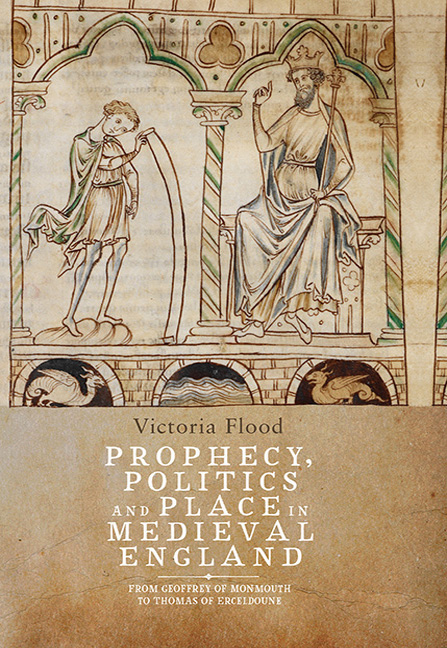Book contents
- Frontmatter
- Dedication
- Contents
- List of Illustrations
- Acknowledgements
- Abbreviations
- Introduction: An Island of the Ocean
- 1 ‘Cadualadrus Conanum uocabit’: Political Prophecy in England, the Welsh March, and Ireland, c. 1130s–1260s
- 2 ‘E si finerount les heirs d'engleterre hors de heritage’: Galfridian Prophecy and the Anglo-Scottish Border, c. 1301–30s
- 3 ‘Whan shal this be?’ The English Erceldoune Tradition, c. 1310s–90s
- 4 ‘A dede man shall make bytwene hem acorde’: Cock in the North and Ceiliog y North, c. 1405–85
- Conclusion
- Bibliography
- Index
Conclusion
Published online by Cambridge University Press: 09 May 2017
- Frontmatter
- Dedication
- Contents
- List of Illustrations
- Acknowledgements
- Abbreviations
- Introduction: An Island of the Ocean
- 1 ‘Cadualadrus Conanum uocabit’: Political Prophecy in England, the Welsh March, and Ireland, c. 1130s–1260s
- 2 ‘E si finerount les heirs d'engleterre hors de heritage’: Galfridian Prophecy and the Anglo-Scottish Border, c. 1301–30s
- 3 ‘Whan shal this be?’ The English Erceldoune Tradition, c. 1310s–90s
- 4 ‘A dede man shall make bytwene hem acorde’: Cock in the North and Ceiliog y North, c. 1405–85
- Conclusion
- Bibliography
- Index
Summary
I'll speke a prophecy ere I go:
When priests are more in word than matter;
When brewers mar their malt with water;
When nobles are their tailors’ tutors;
No heretics burn'd, but wenches’ suitors;
Then shall the realm of Albion
Come to great confusion.
(King Lear, III. II, 80–86)I begin this conclusion with a quotation from Shakespeare's fool, who ascribes the verse to Merlin, although faithful to the logic of Shakespeare's Galfridian universe, he informs us that he ‘lives before his time’ (95). The debt of the fool's forecast to prophecies in circulation from at least the mid-fifteenth century, bearing Merlin's name, is well noted. This material also bears a debt to the English Erceldoune tradition, not least in its use of the ‘when-then’ formula. Although often regarded as a burlesque, it reads as the end product of a continuous English tradition, which goes all the way back to the twelfth century. This alone makes it a particularly fitting end to my study. More importantly still, however, this prophecy, which locates itself in the distant British past, encompasses something of the double pan-insularity of the English prophetic tradition, from which it derives its medieval inheritance: a concern with pan-insular rule, and an engagement with prophetic influences from across Britain.
The fool's prophecy, concerned with the coming of ‘confusion’ to the realm of ‘Albion’ (the earliest name given to Britain in Geoffrey's Historia), relates directly to Lear's division of his kingdom, a scene of insular splitting inspired by the pan-insular fantasies and concerns of the Historia, itself indebted to a much older Welsh anxiety about the historical fragmentation of British insular rule. We might note also, its debt to a Scottish tradition: ‘Albion’ recalls the name of the second son of Brutus, Albanactus, from whom, in the false etymologies of the Historia, the name for Scotland is derived (Albania). Indeed, Shakespeare almost certainly had in mind Scottish prophecies relating to the accession of James VI of Scotland as James I of England in 1603, of the type found in the Whole Prophesie of Scotland, then in English circulation. As we have already noted, the Erceldoune tradition loomed large in this collection. Shakespeare gives his fool a prophecy concerned with insular rule, after the British tradition. ‘British’ is a term which I employ in the knowledge that is fraught, complicated, and multifaceted.
- Type
- Chapter
- Information
- Prophecy, Politics and Place in Medieval EnglandFrom Geoffrey of Monmouth to Thomas of Erceldoune, pp. 199 - 204Publisher: Boydell & BrewerPrint publication year: 2016

